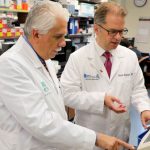Pharmacists at the Helm of Pharmacogenomics Efforts

Pat Peters and his daughter, Trish Brown
AFTER SUFFERING A HEART ATTACK IN 2014, Pat Peters needed a percutaneous coronary intervention (PCI) – a procedure that many Americans undergo each year. However, unlike most other patients, Peters was lucky to have a seasoned genetic counselor and pharmacogenomics advocate by his side.
Pharmacogenomics Impact
“When my dad’s physician placed an order for clopidogrel as antiplatelet therapy, I knew from a pharmacogenomics test that he was one of the [small number] of the population that are CYP2C19 poor metabolizers, so clopidogrel would have been ineffective for him,” said Pat’s daughter, Trish Brown, who is director of AMR Payer Partnerships and Field Market Access at Illumina, a genetic sequencing company based in San Diego.
With over 20 years of experience in the genomics industry, Brown knew pharmacogenomics could immensely improve treatment decisions and improve the likelihood a drug will be safe and effective. With that in mind, she had her father’s genome preemptively tested for known gene-drug pairs. When it came time for the discussion with the cardiologist about post-PCI antiplatelet therapy, Brown informed the physician of her father’s CYP2C19 status.
“Thankfully, the cardiologist accepted the genomic results and chose an alternative agent, but unfortunately, there was no place to include the test results in the EHR other than as a PDF attached to a clinical encounter, where it would really just sit and not be seen,” Brown said, noting the hospital also did not have any staff that knew how to order or interpret genetic test results.
Pioneering Pharmacogenomics
Peters’ experience stands in contrast to the care pharmacists at St. Jude Children’s Research Hospital in Memphis, Tennessee, help provide. For the past 30 years, pharmacists have been incorporating pharmacogenomics results to help their physicians make the best treatment decisions possible.

Mary Relling, Pharm.D.
Although the hospital’s patient population is almost entirely pediatric, there was one instance where pharmacogenomics proved invaluable when a patient needed antiplatelet therapy, explained Mary Relling, Pharm.D., who holds an endowed chair in the Department of Pharmacy and Pharmaceutical Sciences at the hospital.
“This particular patient was ordered clopidogrel, and we had tested her CYP2C19 status in advance and found she lacked the gene needed to activate clopidogrel. Thus the drug would have been ineffective for preventing stroke,” said Dr. Relling, who spoke during a Pharmacogenomics Virtual Summit jointly organized by ASHP and the American Medical Association.
Avoiding potentially ineffective care in this patient “goes to show that while it’s usually a minority of the population that has a high-risk genotype, for that small percentage of patients, pharmacogenomics testing can yield a really big benefit,” she said.
Pharmacogenomics is deeply embedded at St. Jude, with Dr. Relling and her team regularly testing for genes like thiopurine methyltransferase (TPMT) and CYP2D6, which affect the metabolism of medications more commonly used there, like thiopurines for leukemia and codeine for pain.
Implementing Actionable Findings
Since 2011, pharmacists at St. Jude leading the PG4KDS program have tested for hundreds of gene variants and used those genetic data to improve medication efficacy and safety outcomes. They have so far enrolled nearly 6,000 patients and implemented 14 genes affecting 66 drugs, Dr. Relling said.
“We want to implement as many actionable findings into the electronic health record as we can, along with decision support tools, and we want to provide specific recommendations to help make better treatment decisions,” explained Dr. Relling.
One of Dr. Relling’s most significant contributions to the field of pharmacogenomics was co-founding the Clinical Pharmacogenetics Implementation Consortium (CPIC) in 2009. The 400 members of CPIC, from 269 institutions in 36 countries, generate peer-reviewed and evidence-based guidelines for providers, pharmacists, and laboratories to follow.
“We want to make these guidelines freely available to whichever institutions and laboratories want to incorporate pharmacogenomics into routine care,” Dr. Relling said. She noted that while institutions using pharmacogenomics are in the minority today, “the number is slowly growing.”
Incorporating Findings in the EHR
While Dr. Relling and her CPIC partners are developing guidelines for pharmacogenomics-based decision making, affiliates of the Implementing Genomics in Practice (IGNITE) Consortium are focusing on how best to incorporate and implement these results into the healthcare workflow.
At the University of Alabama at Birmingham School of Medicine, which is an IGNITE affiliate, Nita Limdi, Pharm.D., Ph.D., MSPH, director of the program for translational pharmacogenomics and associate director of the Hugh Kaul Precision Medicine Institute, and her colleagues are documenting what they believe will be better outcomes when genomic information is used to guide the treatment of patients like Pat Brown undergoing PCI.
To improve the chances that pharmacogenomics results are integrated into the treatment decision-making process, Dr. Limdi and a health system informatics team are developing a “genomic medicine landing page” in their EHR, where pharmacogenomic results and recommendations will be housed.
“Our position has always been that once you find something that is important to patient care, you put it in the hands of clinicians,” said Dr. Limdi, an ASHP member.
Preemptive Whole Panel Testing
Dr. Limdi hopes to further expand use of pharmacogenomics at her institution through in-house whole-panel preemptive and reactive testing. She and her team are in the process of validating the system and plan to offer it to all hospital service lines.

Nita Limdi, Pharm.D., Ph.D., MSPH
“While most testing has been done reactively— for a patient who has not responded to treatment with an antidepressant, for example — I believe it will become fairly routine to do whole-panel testing preemptively,”Dr. Limdi said.
Dr. Limdi’s conviction that pharmacogenomics holds great value is partly rooted in her experience as a pharmacist specializing in neurosciences, when she observed patients inconsistently responding to drugs like warfarin and anti-epileptics.
“Coming from that service line gave me a really deep appreciation for how much of the variability in drug response can be accounted for by genomic factors and how useful it is to have that genomic information in the patient’s record,” she said.
Pharmacogenomics Pharmacist Teams
In another effort to increase the use of pharmacogenomics at her institution, Dr. Limdi is building a team of specialized pharmacogenomics pharmacists who will lead testing efforts at her hospital. An innovative part of the model is that these pharmacogenomics pharmacists will mentor clinical pharmacists in the use of pharmacogenomics as it applies to their specialty.
“The idea is to have our pharmacogenomics service line start by doing all the initial genotype interpretation and consults, but as they hand off those results to clinical pharmacists embedded in different units, they will also shepherd them so they can be proficient in interpreting results on their own,” said Dr. Limdi.
If the model proves successful, it could be adopted at other institutions to integrate pharmacogenomics testing into routine clinical care, she suggested. As the demand for pharmacogenomics services increases, a highly specialized pharmacogenomics service team would be free to manage more complex cases, such as those with polygenic drug response signatures.
Pharmacogenomics programs like those at St. Jude’s and the University of Alabama are only two examples of the initiatives pharmacists are leading across the country. Dr. Limdi believes this is an area of care that will grow tremendously in the coming years. “This is very much an evolving field, and I’m really excited about the possibilities it will bring,” she said.
By David Wild








 If you want to contribute tutorials, news or other stuff please contact us. We pay 150 for each approved article.
If you want to contribute tutorials, news or other stuff please contact us. We pay 150 for each approved article. Consectetur adipisicing elit. Sed do eiusmod tempor incididunt ut labore.
Consectetur adipisicing elit. Sed do eiusmod tempor incididunt ut labore. This site uses valid HTML and CSS. All content Copyright © 2010 Newscast, Inc
This site uses valid HTML and CSS. All content Copyright © 2010 Newscast, Inc If you like what we do, please don't hestitate and subscribe to our
If you like what we do, please don't hestitate and subscribe to our